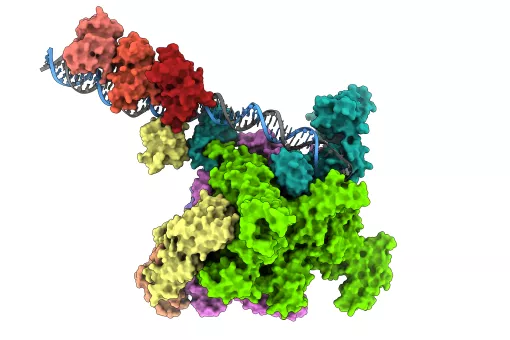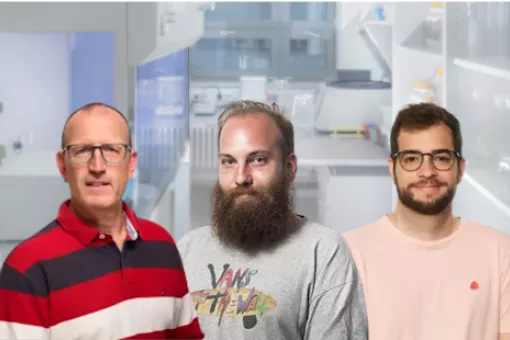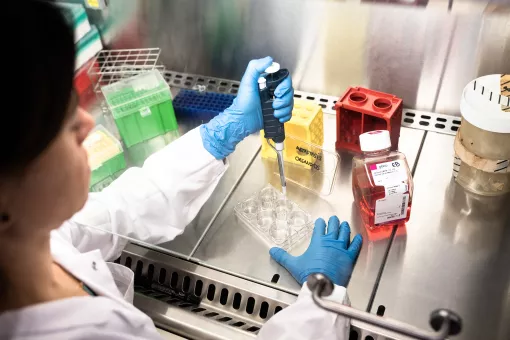Images
Published in the journal Nature Cancer, the study analyses how genetic alterations in tumour cells prevent the correct degradation of the proteins involved in tumour development and growth, thereby leading to abnormal cell behaviour.
A machine-learning model has allowed the scientists to obtain the most extensive annotation of the ubiquitin-mediated protein degradation system.
The analysis proposes a potential new clinical approach for cancer through the inhibition of oncoproteins with impaired degradation systems.
To understand the molecular bases of cancer, it is imperative to determine the genetic alterations responsible for the development and spread of this condition and to identify the mechanisms through which healthy cells become malignant.
In the last twenty years, various studies have identified some of the genetic alterations that disrupt protein degradation and play a key role in tumorigenesis. Cancer cells that harbour these kinds of defects accumulate certain oncogenic proteins, which cause cells to behave abnormally. However, the extent to which such deregulated protein degradation contributes to the development of cancer was unknown.
A team at the Institute for Research in Biomedicine (IRB Barcelona) led by the scientists Abel David González-Pérez and Núria López-Bigas, the latter ICREA researcher and head of the Biomedical Genomics Lab and associate professor at the Pompeu Fabra University, has revealed how some alterations in the protein degradation system play a key role in tumour development. The study has been published in the journal Nature Cancer.
Using hundreds of proteins, the team identified the specific degradation sequences, that is to say, the precise fragments that are recognised and that trigger tagging by ubiquitin for later degradation. In this first phase, the researchers developed a machine-learning model that identifies these recognition sequences on the basis of their biochemical properties.
To validate the recognition sequences identified in these proteins, the scientists examined the mutations observed in more than 7,000 tumour samples from patients and in 900 cancer cell lines. The authors of the study demonstrate that most of the mutations in protein recognition regions trigger their stabilization. These data allowed them to validate the prediction model and to determine that a considerable number of these new predictions may indeed be functional.
“During the study, we have identified hundreds of potential protein recognition sequences for ubiquitin tagging, which constitute reliable candidates for experimental validation,” explains the co-leader of the study González-Pérez.
With the aim to determine which of the recognition sequences identified are used by the tumour to evade the degradation of onogenic proteins, the team later analysed the genetic mutations present in the 7,000 tumour samples and 900 cancer cell lines.
The study concludes that a considerable number of mutations caused by tumours (approximately 1 in 10) occur in oncoproteins (including some that have not previously been reported), which exploit this mechanism to evade degradation.
On the basis of their findings, the researchers propose a potential new clinical approach to tackle cancer, namely the inhibition of oncoproteins that show defective degradation.
“The idea consists ofusing approved drugs to inhibit an oncoprotein that is overexpressed in the cell because of impaired ubiquitin-mediated degradation machinery. This model would allow a wider spectrum of patients to benefit from therapies that are currently approved for clinical use or that are in clinical trials,” says Francisco Martínez-Jiménez, IRB Barcelona researchers and first author of the work.
The study has been made possible thanks to the patients who have generously allowed their samples to be used for research purposes. The authors also acknowledge the help of the medical faculty that took the samples, and all the researchers involved in the TCGA and CCLE projects for making the data on mutations, mRNA expression and protein expression publicly available. “This study exemplifies how data sharing can push science forward,” says González-Pérez.
The research was funded by the European Research Council (ERC) and the Ministry of Science, Innovation and Universities of the Government of Spain.
Reference article:
Francisco Martínez-Jiménez , Ferran Muiños, Erika López-Arribillaga, Nuria Lopez-Bigas and Abel Gonzalez-Perez
Systematic analysis of alterations in the ubiquitin proteolysis system reveals its contribution to driver mutations in cancer
Nature Cancer (2019) DOI: 10.1038/s43018-019-0001-2
About IRB Barcelona
The Institute for Research in Biomedicine (IRB Barcelona) pursues a society free of disease. To this end, it conducts multidisciplinary research of excellence to cure cancer and other diseases linked to ageing. It establishes technology transfer agreements with the pharmaceutical industry and major hospitals to bring research results closer to society, and organises a range of science outreach activities to engage the public in an open dialogue. IRB Barcelona is an international centre that hosts 400 researchers and more than 30 nationalities. Recognised as a Severo Ochoa Centre of Excellence since 2011, IRB Barcelona is a CERCA centre and member of the Barcelona Institute of Science and Technology (BIST).










